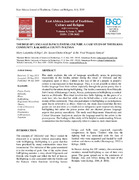| dc.contributor.author | Simiyu, Fred Wanjala | |
| dc.contributor.author | Kibigo, Mary Lukamika | |
| dc.contributor.author | Choge, Susan Chebet | |
| dc.date.accessioned | 2021-03-12T06:43:26Z | |
| dc.date.available | 2021-03-12T06:43:26Z | |
| dc.date.issued | 2019-09-06 | |
| dc.identifier.uri | http://erepository.kibu.ac.ke/handle/123456789/2322 | |
| dc.description.abstract | The study explores the role of language specifically nouns in portraying masculinity in the Isukha culture during the ritual of Shilembe and the indigenous sport of Mayo. Culture is the way of life of a people. A people’s culture is encompassed in their language. Thus, it is not possible to delink the Isukha language from their culture especially through the praise poetry that is chanted by the artists during bullfighting. The Isukha community from Shinyalu Sub County of Kakamega County, Kenya, participates in bullfighting as a ritual known as Shilembe. This ritual involves two bulls fighting on the grave of a male hero who has died but while alive he killed either a wild animal or an enemy of the community. They also participate in bullfighting as an indigenous sport that is referred to as Mayo. However, the study discovered that the two games are not just done as a ritual and an indigenous sport respectively during bullfighting but rather the praise poems that are chanted possess language aspects that portray masculinity. The study used Hegemonic Masculinity and Critical Discourse Analysis to analyse the language used by the artists in the praise poems. The findings of this study will be helpful in understanding African communities like the Isukha, especially when it comes to male chauvinism. | en_US |
| dc.language.iso | en | en_US |
| dc.publisher | KIBU | en_US |
| dc.rights | Attribution-NonCommercial-ShareAlike 3.0 United States | * |
| dc.rights.uri | http://creativecommons.org/licenses/by-nc-sa/3.0/us/ | * |
| dc.subject | Praise Poetry | en_US |
| dc.subject | Shilembe | en_US |
| dc.subject | Mayo | en_US |
| dc.subject | Bullfighting | en_US |
| dc.subject | Hegemonic Masculinity Theory | en_US |
| dc.subject | Critical Discourse Analysis | en_US |
| dc.subject | Onomastics | en_US |
| dc.subject | Anthroponym | en_US |
| dc.subject | Toponym | en_US |
| dc.title | The Role of Language in Facilitating Culture: A Case Study of the Isukha Community, Kakamega County in Kenya | en_US |
| dc.type | Other | en_US |

